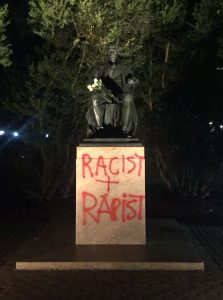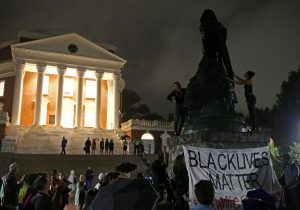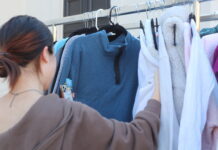
Early Friday morning, a statue of Thomas Jefferson just off of the UVa Lawn was spray painted with the words “Racist + Rapist.”
The paint was removed a few hours after it was discovered. The date of the incident, April 13th, was Founder’s Day and marked Jefferson’s 275th birthday.
This particular case is just one of several recent instances in which UVa students and Charlottesville community members are pushing to re-contextualize and re-evaluate the legacy of the university’s founder. Previous incidents include the shrouding of the Jefferson statue near the Rotunda steps in the fall.
Black Lives Matter Charlottesville released a statement on their Facebook page accompanying a picture of the recently defaced statue. It read:”The truth hurts. We are all fallible creatures. We all have good parts and bad parts intermingled. The problem with the way our founding fathers are viewed is that they are not allowed to be human. They have been elevated to God like status and therefore can no longer inhabit the negative parts of their own life.”

Courtesy of the Richmond Times
The statement continued to explain that Jefferson “was a politician, an architect, a slave owner, a rapist. All of these things must exist together. To separate them is to tell a lie, that not only diminishes us as a society, but him as a human being. It should not be lost on anyone that this is exactly the same thing that he did to every slave he owned on a daily basis.”
On Friday, UVa spokesperson Anthony de Bruyn released a statement via The Washington Post encouraging community members to engage in dialogue when it comes to revisiting Jefferson’s past.
“UVA welcomes open and civil discourse on such important issues. However, acts of vandalism do not contribute to meaningful discussion,” said de Bruyn.
WUVA News asked UVa students to share their thoughts on the act of vandalism and express their perspectives regarding TJ’s legacy.
Maria D., a fourth year student, explained that: “I have no obligation to feel or show respect for someone who thought that people of color, queer people, and women/non-binary people didn’t deserve to be at UVA.
“Disrespect is the appropriate response to his legacy,” she concluded.
Students from marginalized communities are often Jefferson’s toughest critics and have been quick to remind others of the UVa founder’s past as a slave owner.
Another student argued that the issue at hand is far more complex than most realize.
“Yes, Jefferson has a lot of problems and hypocrisies that we shouldn’t overlook but we also should not overlook some of his beneficial contributions…Without him, none of us would be here [at UVa].”
A fourth year student, who requested to remain anonymous, expressed that: “There’s no reason we should need to judge someone as just good or bad…We can just acknowledge that [Thomas Jefferson] is complicated.”
A first year student who also requested to remain anonymous, took a different approach, begging for students to engage in dialogue and encourage “intellectual diversity.”
“The vandalism of the statue of Thomas Jefferson is not only an ignorant misinformed gesture but it is one that symbolizes the prevalence of selective acceptance on many college campuses around the nation,” the first year noted. “Thomas Jefferson is deified for his advocacy for academia and his role in the founding of this nation. Thomas Jefferson was also a racist and a rapist. Does this warrant the vandalism of his statue? No.”
The student added that judging historical figures by today’s cultural standards is an issue.
“The fact of the matter is that in any individuals past you will find bad and good; recognize both and find balance,” the first year concluded.
It remains unclear who was responsible for spray painting the statue. Investigations are ongoing.
















